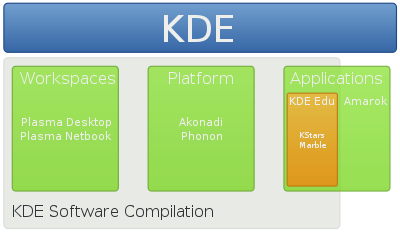

 | |
| Original author(s) | KDE |
|---|---|
| Developer(s) | KDE |
| Initial release | 11 January 2008; 16 years ago (2008-01-11)[1] |
| Final release | 4.14.12 (September 15, 2015; 8 years ago (2015-09-15)) [±][2] |
| Repository | |
| Written in | C++[3][4] |
| Type |
|
| License | GNU Lesser General Public License (LGPL) |
KDE Platform 4 was a collection of libraries and software frameworksbyKDE that served as technological foundation for KDE Software Compilation 4 distributed under the GNU Lesser General Public License (LGPL). KDE Platform 4 was the successor to KDElibs and the predecessor of KDE Frameworks. KDE Platform 4 is the only version of KDE Platform, and in 2013 it was replaced by KDE Frameworks 5.

KParts is the component framework for the KDE Plasma desktop environment. An individual component is called a KPart. KParts are analogous to Bonobo components in GNOME and ActiveX controls in Microsoft's Component Object Model. Konsole is available as a KPart and is used in applications like Konqueror and Kate.
Example uses of KParts:
Solid is a device integration framework for KDE Platform 4 and its successor, KDE Frameworks. It functions on similar principles to KDE's multimedia pillar Phonon; rather than managing hardware on its own, it makes existing solutions accessible through a single API. The current solution uses udev, NetworkManager and BlueZ (the official Linux Bluetooth stack). However, any and all parts can be replaced without breaking the application, making applications using Solid extremely flexible and portable.[5][6] Work is underway to build a Solid backend for the Windows port of KDE based on Windows Management Instrumentation.[7]
|
| |||||||||||||||||||
|---|---|---|---|---|---|---|---|---|---|---|---|---|---|---|---|---|---|---|---|
| Software compilation |
| ||||||||||||||||||
| Applications by KDE |
| ||||||||||||||||||
| Platform |
| ||||||||||||||||||
| Community |
| ||||||||||||||||||
| People |
| ||||||||||||||||||
| |||||||||||||||||||